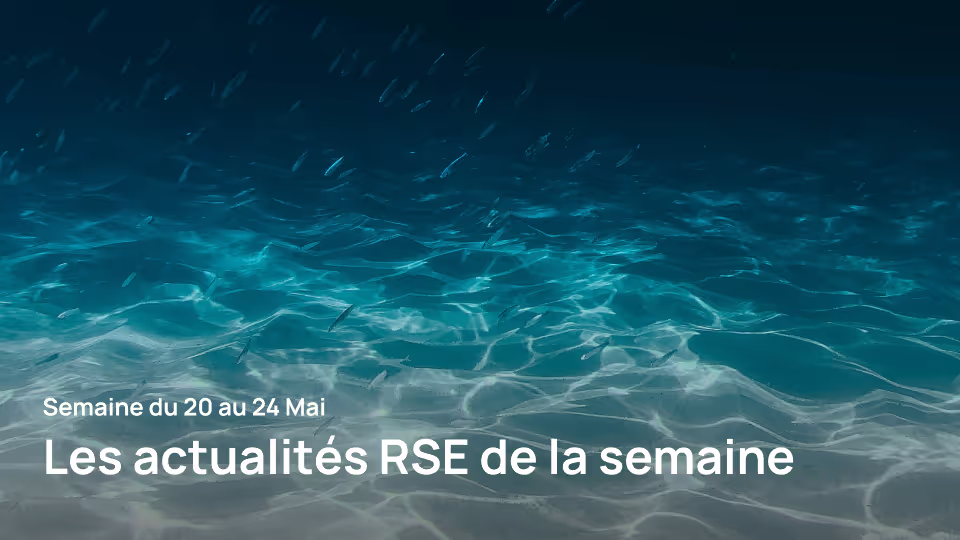Welcome to this week’s 10 CSR news stories!
Microsoft is facing a rise in its emissions despite its climate targets, and the ISSB is being criticized for prioritizing financial profitability.
“Fast-deco” is causing an increase in furniture waste, while the new birth leave in France is sparking debate.
Arcep launches a new digital eco-design framework, and the concept of “permaeconomy” emerges to better integrate biodiversity into business.
Philanthropy and CSR still struggle to find balance, and the results of the Pacte Law remain mixed.
Paris triples SUV parking fees, and France announces a 5.8% drop in greenhouse gas emissions in 2023.
Discover these ten highlights of the week.
At Microsoft, incompatibility between AI and climate goals
While the tech giant aims to achieve carbon neutrality by 2030, its emissions have increased by 30% over the past four years.
The reason: major investments in AI and the rapid rise in user numbers.
Powering and cooling data centers consumes vast amounts of energy and water. The growing use of generative AI is worsening Microsoft’s carbon footprint — and it is expected to increase further with GPT-4, which is multimodal (handling text, video, image, and sound).
“For 100 million people using it, we reach 2 million tons of CO2 — equivalent to a CAC40 company.”
— Théo Alves da Costa, Co-President of Data for Good
The ISSB prioritizes financial logic over the biosphere
In an opinion piece for Novethic, Alexandre Rambaud, lecturer at AgroParisTech and specialist in financial accounting, denounces the International Sustainability Standards Board (ISSB) for clinging to a single-materiality approach.
According to him, this vision “makes invisible” the importance of human capital and biodiversity in corporate responsibility.
He criticizes how the ISSB diverts sustainability issues in favor of financial profitability:
“Nature is seen as material only because of its financial consequences.”
Finally, he argues that behind the stated ambition of creating a non-financial reporting framework lie market interests and resistance to a true paradigm shift.
Fast-deco and the rise of furniture waste
A recent Zero Waste France report explores the phenomenon of “fast-deco” — the interior design version of “fast fashion.”
Its environmental impact is significant and growing: between 2014 and 2020, furniture waste doubled.
Sales of furniture and decorative objects rose by 88% between 2017 and 2020, from 270 to 500 million items — around 17 pieces per household per year.
Organizations highlight the low rates of repair, recycling, and reuse. In 2022, 1.3 million tons of furniture waste were collected, and the French furniture industry has lost a quarter of its jobs in the past 15 years.
Towards a cap on birth leave?
President Emmanuel Macron gave details about the planned “birth leave,” which will complement the current parental leave.
The aim: shorter but better-paid leave.
The three main criteria announced are:
- 3 months per parent (can be combined)
- 50% salary compensation
- Capped at €1,900
However, consultation meetings revealed criticism, particularly that 50% compensation may discourage some parents from taking the leave.
The new measure should be available by the end of 2025, as part of the next Social Security budget.
A new framework for digital eco-design
Arcep (France’s electronic communications regulator), in collaboration with ADEME and Arcom, has published a digital eco-design framework to help professionals reduce their environmental footprint.
This guide supports responsible design practices for digital services — websites, apps, video platforms, and AI tools — all highly energy-intensive systems.
The framework includes 78 criteria with practical implementation guidance, covering every stage of the production chain:
“From the initial strategy to hosting, including architecture design and content development.”
“Permaeconomy” puts living systems back at the center
Emmanuel Delannoy, a specialist in corporate-biodiversity relations, reminds us that the sixth mass extinction is underway — and human activities are its primary cause, with extinction rates 100 to 1,000 times higher than natural levels.
He notes that business economies are highly dependent on biodiversity:
“Sectors directly dependent on biodiversity generate €275 billion in France.”
His proposal: a “permaeconomy” that redefines how businesses interact with nature — not to constrain or dominate it, but to let it thrive and adapt.
Do CSR and philanthropy really go hand in hand?
OpenLab, an initiative led by Admical, explores the relationship between philanthropy and CSR. Its findings:
- Only 9% of French companies engage in philanthropy.
- As philanthropy is meant to be selfless, it may conflict with CSR’s strategic goals.
To avoid “mixing genres” or greenwashing, OpenLab suggests best practices — first among them:
“Philanthropy cannot compensate for weak CSR performance.”
It also warns against reducing philanthropy to a financial lever or creating hierarchies between CSR and philanthropy.
Pacte Law and CSR: A mixed review
Five years after the Pacte Law, which introduced new corporate purpose models and “mission-driven” companies, its impact remains limited.
According to Novethic, “the great sustainable transformation of companies hasn’t really happened.”
Experts criticize a kind of corporate theater — a show of commitment without real process transformation.
Corporate “purposes” remain vague, and only 1,600 companies have adopted mission status — far from a systemic shift in French CSR practices.
Parking in Paris will cost triple for SUVs
The Paris Council has voted to triple parking fees for SUVs, following the February referendum (5.68% turnout) where most voters supported a special tariff for heavy vehicles.
This applies to cars over 1.6 tons (2 tons for electric vehicles):
- €225 for six hours of parking in central districts (1st–11th), compared to €75 today.
Exemptions apply to taxis, health professionals, tradespeople, and people with reduced mobility.
The government announces a 5.8% drop in GHG emissions
Prime Minister Gabriel Attal announced that France’s greenhouse gas emissions fell by 5.8% in 2023 compared to 2022, citing Citepa’s interim report.
This message serves both as a political signal ahead of the European elections and a reminder of France’s –50% GHG reduction goal by 2030.
However, NGOs warn this may be a “cyclical drop” linked to a mild winter and economic slowdown rather than long-term ecological commitment.
Sources:
Novethic – “Artificial intelligence is putting Microsoft's climate goals at risk”
Youmatter – “Combining sponsorship and CSR: good practices”
CSR Magazine – “Digital: Arcep publishes a framework for greener services”
Le Monde – “Greenhouse gas emissions fell by 5.8% in France in 2023”
Novethic – “The ISSB is attacking human capital and biodiversity”
Carenews – “Furniture waste in France doubled between 2014 and 2020”
Reporterre – “Heavy cars will pay 3 times more to park in Paris”
Youmatter – “Biodiversity: why companies must change their relationship with living things”
Novethic – “Pacte Law: five years later, few concrete advances for CSR”
Carenews – “The birth leave consultations launched”
Bon à savoir : Lorem ipsum dolor sit amet, consectetur adipiscing elit, sed do eiusmod tempor incididunt ut labore et dolore magna aliqua. Ut enim ad minim veniam, quis nostrud exercitation ullamco laboris nisi ut aliquip ex ea commodo consequat. Duis aute irure dolor in reprehenderit in voluptate velit esse cillum dolore eu fugiat nulla pariatur.


.avif)


